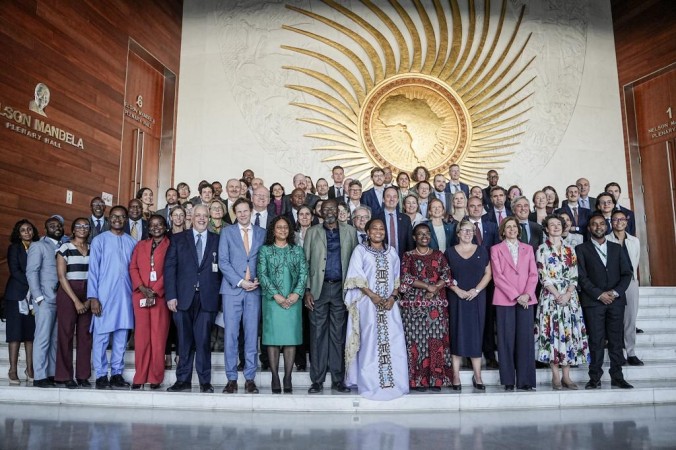 Photo of EU-AU delegates in Addis Ababa, Ethiopia
Photo of EU-AU delegates in Addis Ababa, EthiopiaIn an effort to strengthen healthcare systems in Africa, the Africa Centre for Disease Control and Prevention (ACDC) and the European Union's Health Emergency Preparedness and Response Authority (HERA) have solidified their collaboration through two groundbreaking agreements.
With a commitment of €6 million (US$6.5 million) from the European Union, these accords aim to elevate genomic surveillance of diseases and fortify public health laboratory networks for improved outbreak detection and response.
The projects, to be implemented in partnership with the African Society of Laboratory Medicine and the African Public Health Foundation, will scale up sequencing-based surveillance and strengthen public health laboratory network capacities across the African continent.
The unveiling of this development came from Stella Kyriakides of the European Commissioner for Health and Food Safety, at the onset of a three-day meeting between the African Union and the European Union in Addis Ababa. The funding, pledged by HERA, seeks to support ACDC in scaling up sequence-based disease surveillance and enhancing laboratory capacity throughout Africa.
Belgium, currently holding the EU presidency, has reaffirmed its commitment to fostering pandemic preparedness in Africa. The Belgian development agency has inked a memorandum of understanding with ACDC, underscoring the urgency of bolstering Africa's readiness for health emergencies. As part of its dedication to equitable access to health, Belgium is slated to host a high-level health event with the African Union on March 20th.
These agreements, warmly welcomed by Africa CDC Deputy Director General Dr. Ahmed Ouma, are poised to enhance global health security by augmenting African countries' capacity to detect and respond to health emergencies. The focus of these collaborations extends to supporting Africa CDC's pivotal role as the continent's health implementer, addressing the escalating challenge of antibiotic resistance, and building One Health capabilities—critical in a continent with a high prevalence of zoonotic diseases.
Caroline Gennez, Belgian Minister of Development Cooperation and Major Cities, underscored the global nature of significant challenges during negotiations at the World Health Organization. She emphasised that "Team Europe supports the decentralisation of vaccine and medicine production."
Commissioner Kyriakides reiterated the global nature of health challenges, stating that "when it comes to health, there are no continents and borders." She highlighted Africa as a key priority for the EU, underscoring the commitment to collaborative efforts.
Photo courtesy / EEAS -European Union
Article by Jed Mwangi

Comment